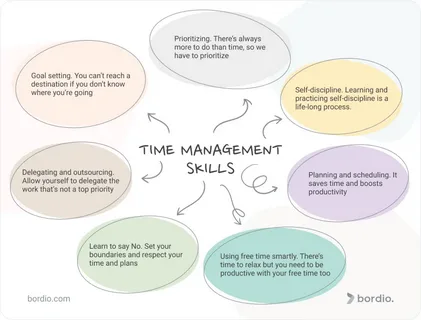Introduction
Mastering time management is essential for professional success and maintaining a healthy work-life balance. This guide builds on our article about long-term career growth and provides practical strategies for maximizing productivity and efficiency in the workplace.
Setting Clear Priorities
Develop a system for identifying and focusing on high-priority tasks. This approach is crucial for career advancement and effective workload management. Use tools like the Eisenhower Matrix to distinguish between urgent and important tasks.
Creating an Effective Schedule
Design a daily and weekly schedule that aligns with your energy levels and priorities. This strategy supports your career planning and helps you maintain focus on important tasks. Block time for deep work, meetings, and breaks to optimize productivity.
Managing Distractions
Implement strategies to minimize interruptions and maintain focus. This skill is essential for sustained career growth. Create a distraction-free work environment, use technology mindfully, and set boundaries with colleagues.
Delegation and Collaboration
Learn to effectively delegate tasks and collaborate with team members. This approach supports your professional relationships and helps you focus on high-value activities. Identify tasks that can be delegated and communicate expectations clearly.
Work-Life Integration
Balance professional responsibilities with personal well-being. This balance is crucial for long-term success and prevents burnout. Set boundaries, schedule personal time, and maintain healthy habits to sustain productivity.
Conclusion
Effective time management is a critical skill for professional success. By implementing these strategies and maintaining a disciplined approach to your schedule, you can enhance your productivity, reduce stress, and create more opportunities for career growth and personal development.
Frequently Asked Questions
Q: How can I prioritize tasks effectively?
A: Start by identifying your most important goals and deadlines. Use a prioritization framework like the Eisenhower Matrix to categorize tasks by urgency and importance. Focus on high-impact activities that align with your objectives and delegate or defer less critical tasks when possible.
Q: How do I handle interruptions and maintain focus?
A: Set clear boundaries and communicate your availability to colleagues. Use techniques like time blocking to create focused work periods, and minimize digital distractions by turning off notifications. Schedule regular breaks to maintain energy and focus throughout the day.
Q: How can I improve my delegation skills?
A: Start by identifying tasks that others can handle effectively. Clearly communicate expectations, deadlines, and desired outcomes. Provide necessary resources and support, but allow team members to take ownership of their work. Follow up regularly and provide constructive feedback to improve delegation effectiveness.

